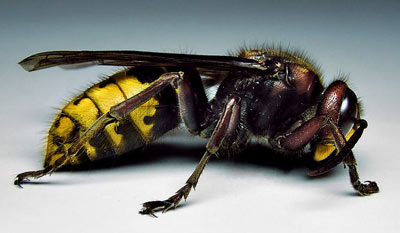The Hornet or Frelon
I knew very little about Hornets until I did some research and the following information has been gleaned from several sites. My thanks to the original Authors..

The hornet (frelon) is a docile insect, and rarely stings people. They don't buzz around your head like a wasp does! However the stings are highly toxic and painful, and can be life-threatening for some. Hence they are not widely loved. However, it requires many, many stings to be fatal to the average human (not just three stings, as is often claimed).
For the large part the hornet eats fruit - especially overripe fruit such as figs. This can attract them from a great distance, as can light at night. They frequently batter themselves on windows in an attempt to reach the light, sometimes continuing until they die from exhaustion. Much larger than the common wasp, perhaps 4-5cm long, the hornet lives usually in holes in trees or in chimneys. A new nest is constructed each year. It is usually only when one of these hornet nests is approached that the hornets become aggressive and are likely to attack.
The revival of interest in these ‘giant
wasps’ dates back about 18 months, when a
new type of asian hornet was accidentally
released in the region - having arrived in a
consignment of pottery they say. This new
variety of hornet has rapidly spread
throughout the region, displacing the local
hornets and posing a grave thread to local
honey producers - the new arrivals destroy
bee hives extremely fast, killing all of the
bees in the swarm.
So how serious is the threat to the rest of
us? It is not clear whether the new hornets
will eventually replace the existing
variety, but apart from bee keepers that is
little cause for concern in the region. They
are no more or less harmful to people than
those already here.
There is said to be a risk that they might
spread northwards, eventually crossing into
the British Isles, although the winter there
may be too cold for them to survive. You’ll
just have to wait and see I’m afraid. With
global warming there will probably be
elephants and zebras in Scotland in 50 years
time.
But what is the risk for a visitor to the
region? Well, very little if a couple of
basic and common-sense precautions are
taken. I have to say, having lived here for
several years, I know of nobody who has
actually been stung by a hornet. They really
are very docile, nothing at all like wasps,
and are only interested in two things (apart
from bee killing):
1) They like over-ripe fruit. So if you are
picking fruit from a tree be careful where
you stick your hand, because a hornet might
be feasting on the other side of that
apple…we had to dramatically prune an old
fig tree next to our gites because of the
hornets it attracted.
2) They LOVE house lights. They will fly
miles to batter themselves to death against
a window if there is a bright light on
inside. This is not a problem. The problem
is if you have all the house windows open at
night, and bright lights on. The hornets
will come on in. You won’t sleep so well if
there are 20 hornets in your bedroom.
They won’t buzz around your head and drive
you mad. You won’t die if one or even
several sting you (although you might well
swear quite a lot). A tube of ’sting cream’
is a good idea in any case. You leave them
in peace and they will leave you in peace.
Don’t try and swat them casually - they are
big and need a big swat! Four or five big
bashes with a sturdy shoe are often
necessary. A gentle bash and you’ll just
make them cross. This is a bad thing.
If you don’t know if you are looking at a
hornet or a wasp, it’s probably a wasp.
Hornets are at least two or three times as
big as wasps, and unmistakable. They make a
loud buzzing - sort of a deep, droning sound
- as they fly, also unmistakable.
So for the time being hornets, like big
yellow striped snakes, are likely to remain
a common feature of holidays in the region -
something to make you run in to the house
shouting ‘you won’t believe what I’ve just
seen’ - but really aren’t a big issue or a
problem. Enjoy your holidays!!!